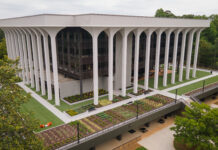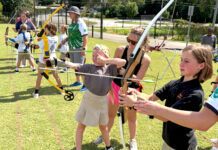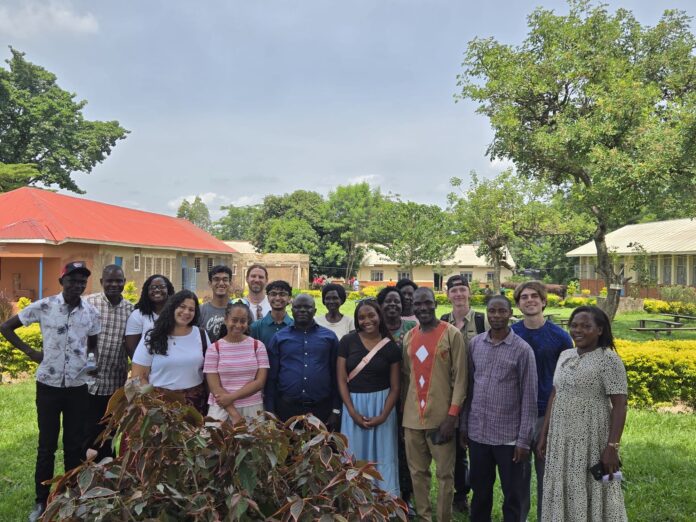
A team of Mercerians collaborated with a Ugandan community to present workshops on topics that were important to them during a three-week trip in May.
Dr. Natalie Bourdon, associate professor of anthropology and women’s and gender studies, and Dr. Ryan Tokarz, assistant professor of global health studies, led eight undergraduate College of Liberal Arts and Sciences students on the Mercer On Mission program to Papoli, Uganda.
Dr. Tokarz first became acquainted with the community of Papoli about 15 years ago while working toward his master’s degree at the University of South Florida. He traveled with a team to Papoli to do a needs assessment there, and Dr. Tokarz always hoped he would have the chance to go back.
“It was one of the communities that had really incredible community organization and lots of different leaders from the local NGO (nongovernmental organization) and local village leaders,” he said. “It seemed like a really good place to have undergraduates begin this process of working in this part of the world. Throughout my career as I was thinking of starting things like Mercer On Mission or otherwise, this little community stuck in the back of my head.”
With support from a Mercer seed grant, Dr. Tokarz and Dr. Bourdon brought three Mercer students to Papoli to do field research in summer 2024. Combining the two professors’ areas of expertise, the team studied rural homebrewers and how their brewing process was affected by socioeconomic status and also how carbon dioxide produced during brewing might affect malarial mosquitoes in the area.
Megan Fachisthers, a rising senior triple-majoring in global health studies, anthropology and Spanish, went on the 2024 trip and returned this summer, so she could spend more time in this community.
“Dr. Tokarz and Dr. Bourdon are my advisors, and they’ve taken me under their wing and poured into me during my time on campus,” she said. “They’re more than professors. They’re in the field. On top of that, they’re so incredibly knowledgeable about eastern African cultures. Traveling with them was the opportunity of a lifetime. I fell in love with Uganda, Papoli and the village we were in.”
The focus for this year’s trip was nutrition and sexual health education, chosen after the professors talked with nongovernmental organization leaders about areas of need. Childhood protein malnutrition is common in this community, so the Mercer team identified local foods and vegetables high in amino acids that could be paired together to create meals with meat-equivalent protein levels, Dr. Tokarz said.
“What we did first when we went to the community is we began immediately talking and engaging with them to get a feel for what they needed,” said Braeden Prince, a rising senior double-majoring in international affairs and psychology. “They were prepared and ready to talk about their foods and growing them and the struggles that come with that.”
The students created a poster and flyers with the protein information and presented it during a workshop that had cooking show and game show elements, Dr. Tokarz said.
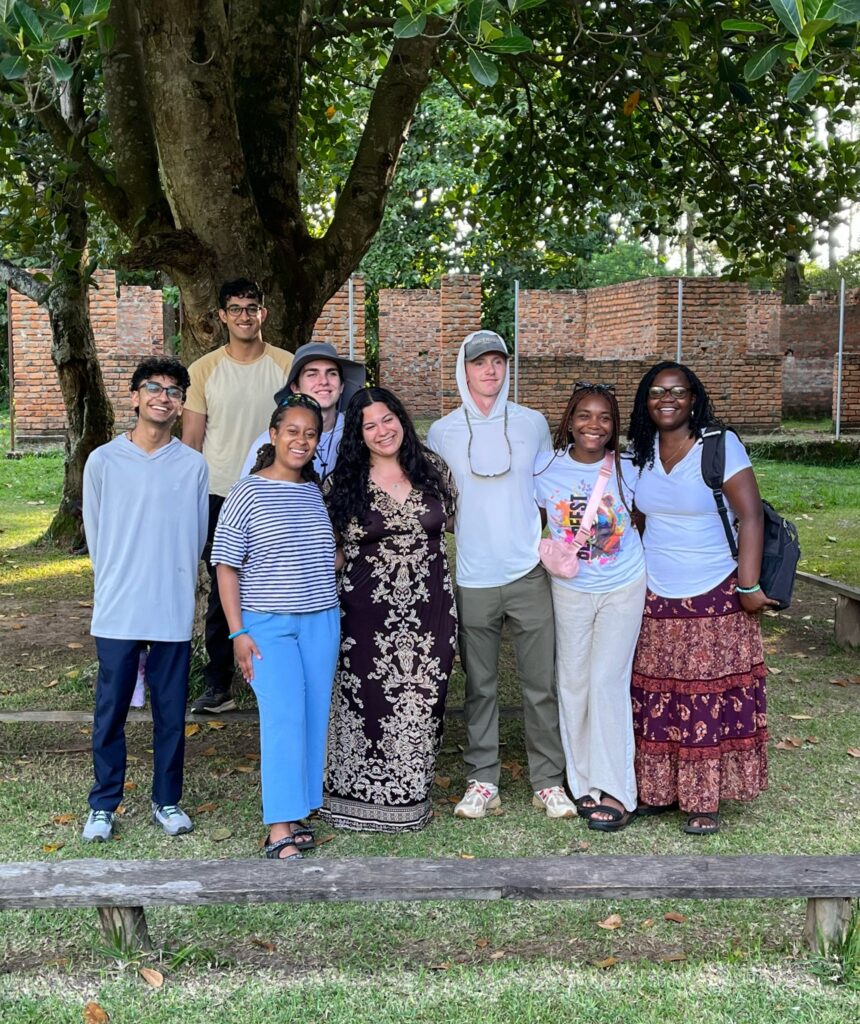
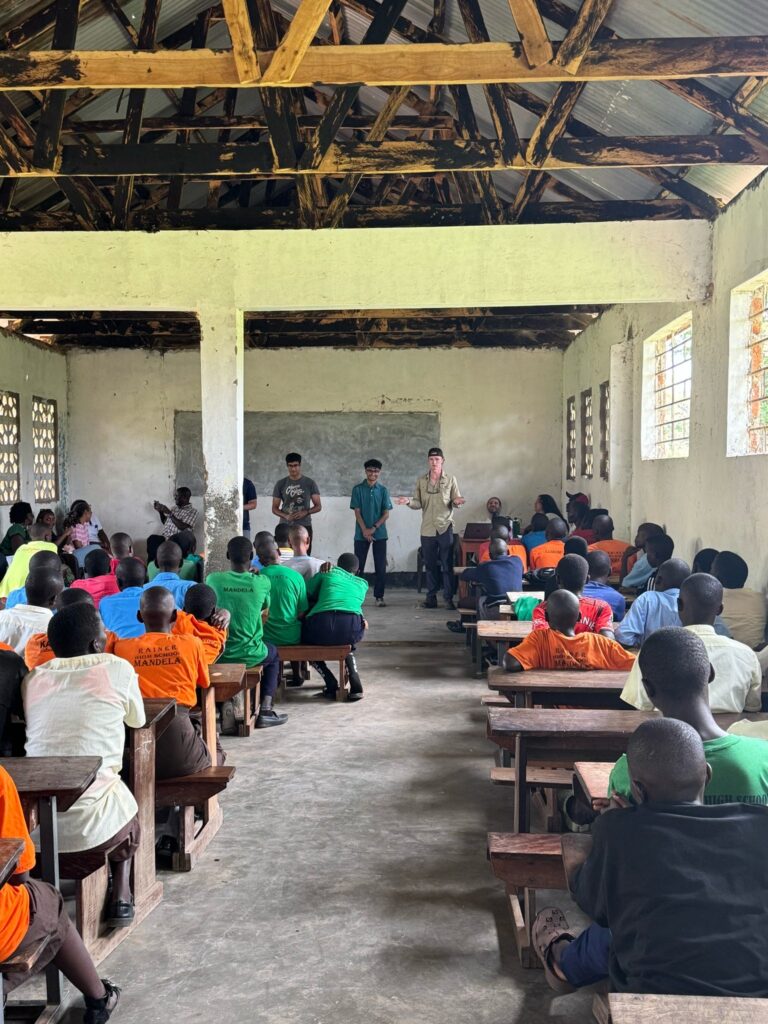
“It was super engaging, and the community just loved it. It was really, really fun, and it provided a lot of discussion about those food choices,” Dr. Bourdon said.
For the sex education component, the four male Mercer students created a group lesson on sexual deviance and inappropriate sexual relationships, and the four female students created a module on good versus bad relationships and gender-based violence, Dr. Bourdon said.
Since these were sensitive topics, the Mercerians practiced the workshop with a small group of youth from the village and then several secondary school teachers and refined the lessons based on the feedback they received.
“We had to make some changes, but we got a lot of things right,” said Latoya Bartley, a rising senior double-majoring in history and anthropology. “It felt good to know we were on the right track. It proves that a community-centered approach is best, and your success will come when you give the power to the people that the intervention was meant to benefit.”
Finally, the Mercer students presented their content to a mixed gender group of more than 100 students at a school and a smaller group in the community.
“The students took the approach of doing interactive lessons, which the teachers said they were very excited about,” Dr. Bourdon said. “It produced a lot of really interesting discussions, so we felt like it went really well. The headmaster also came to sit in on that workshop with the students, and she, along with the teachers, enthusiastically asked that we come back and be in the schools for longer next time we do the program.”
During one portion of the workshop, the Ugandan students wrote questions on sticky notes. The Mercer students were surprised at how many questions they received and how open the Ugandan youth were to discussing these topics. They had to think on their feet when questions came up that clashed with Ugandan cultural values.
“I was glad for those things to arise in the workshops because it was a real learning opportunity for our students … how do you communicate very complex and value-laden ideas? I think that was very impactful for our students,” Dr. Bourdon said.
Manas Patel, a rising senior majoring in chemistry, said this Mercer On Mission trip aligned with his interests in youth health and youth empowerment. He provides mental health education to youth in Middle Georgia through a student organization he co-founded called Mercer Y.O.U.T.H., and those experiences helped prepare him to communicate effectively with the Ugandan youth and keep them engaged.
In addition, each Mercer student created a group module curriculum on another relevant sexual health topic, all of which were printed and given to the school, Dr. Bourdon said. For instance, Prince focused on the legal side of sexual health, including police, courts, access to resources and knowledge about rights. All the lessons followed Uganda’s national guidelines for sex education.
“I want to go to law school and learn how to use law as a tool to promote health outcomes and help people navigate structural barriers for care,” said Bartley, who developed a sexual health curriculum during Dr. Bourdon’s 2023 Mercer On Mission trip to Tanzania and participated in the Uganda trip so she’d have the chance to revisit this work. “For me, this trip was very helpful because I got a lot of insight as to how to do that. We used Ugandan health policy to come up with the lessons. So I will definitely be able to take those skills with me, to learn how to use policies to create a good, culturally relevant lesson.”
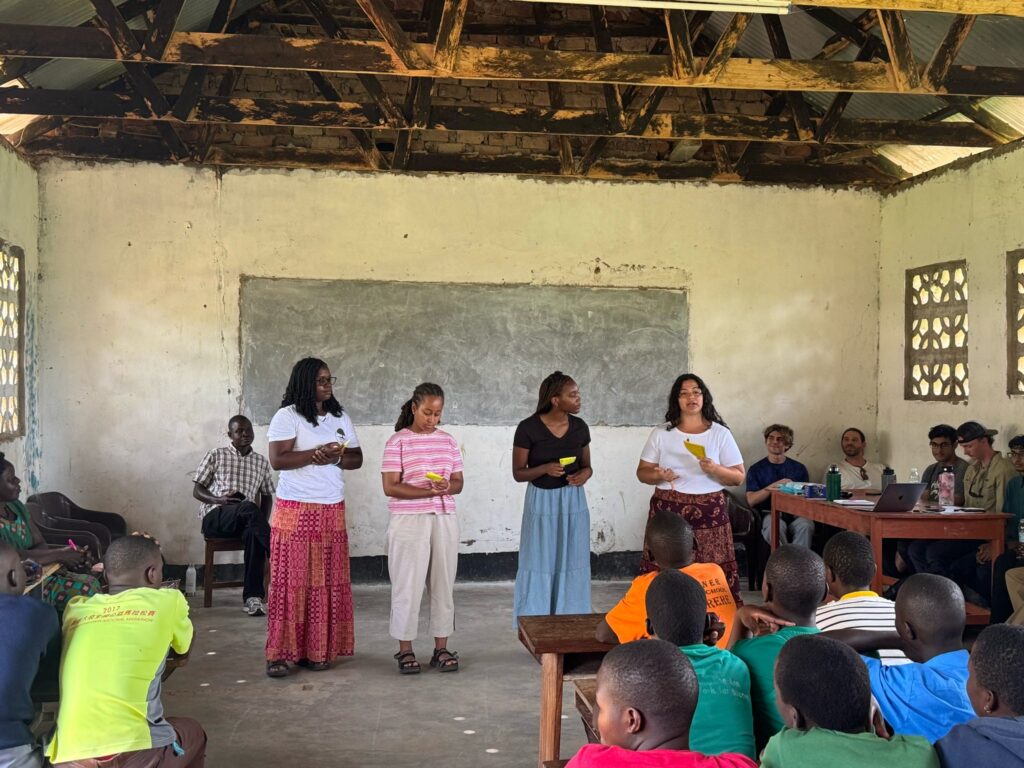
Patel said the Mercer team had to adapt and improvise to meet the community’s needs, and some things were more nuanced and presented more barriers than he anticipated.
“We saw the issues were not as black and white as they seemed. It took a cultural immersion to get the perspective that they have to create a sustainable change,” he said. “Doing something like this is really valuable. I would encourage every student to do something like this where you’re put outside your comfort zone.”
Dr. Tokarz said the Mercer students realized they have a lot in common with this community across the world and that they can use those commonalities to bridge gaps and make connections.
“The big part of this is students realizing the similarities between the youth, the community members and their peers in other countries. It’s not much different, even though the culture and everything else looks completely different,” he said.
As another component of the Mercer On Mission program, the Mercer students each raised $200 prior to the trip for the Papoli community. That $1,600 equated to a substantial amount in Ugandan currency — about 5 million shillings — and the Mercer team met with community leaders to see how these funds could best be used. Ultimately, the money was used to buy four sets of brewing equipment to rotate between the homebrewers that the Mercerians had worked with the year prior; to buy piglets for community volunteers; and to boost the businesses of five youth navigating difficult circumstances, Dr. Bourdon said.
“That was really special because last year we were there for research,” Fachisthers said. “Research is not necessarily mission-oriented. We didn’t go with anything tangible to give them. Getting to go back this year and be able to give them things that would tangibly benefit their lives was really special.”
Outside of their community work, the Mercerians visited the town of Jinja, whitewater rafted on the Nile, climbed a volcanic plug, and visited local markets.
The students also had the option to be paired with a community member for a one-day homestay experience, and Fachisthers was able to reconnect with her host family from the 2024 trip. Prince said the homestay was the most impactful part of the trip for him. He enjoyed being able to eat, speak and attend church with members of his host family, stay on their land, and see how they live.
“The people over there are extremely bright and compassionate people and very kind people. That did not change throughout the entire trip. The homestay did allow for me to observe the most being in the culture,” Prince said.
Fachisthers said she is grateful for the connections she has made through this Mercer On Mission experience.
“Missions are where my heart is,” Fachisthers said. “I could very much see myself returning to a place like Papoli after residency and volunteering in a clinic. I’m really excited about that possibility.”


